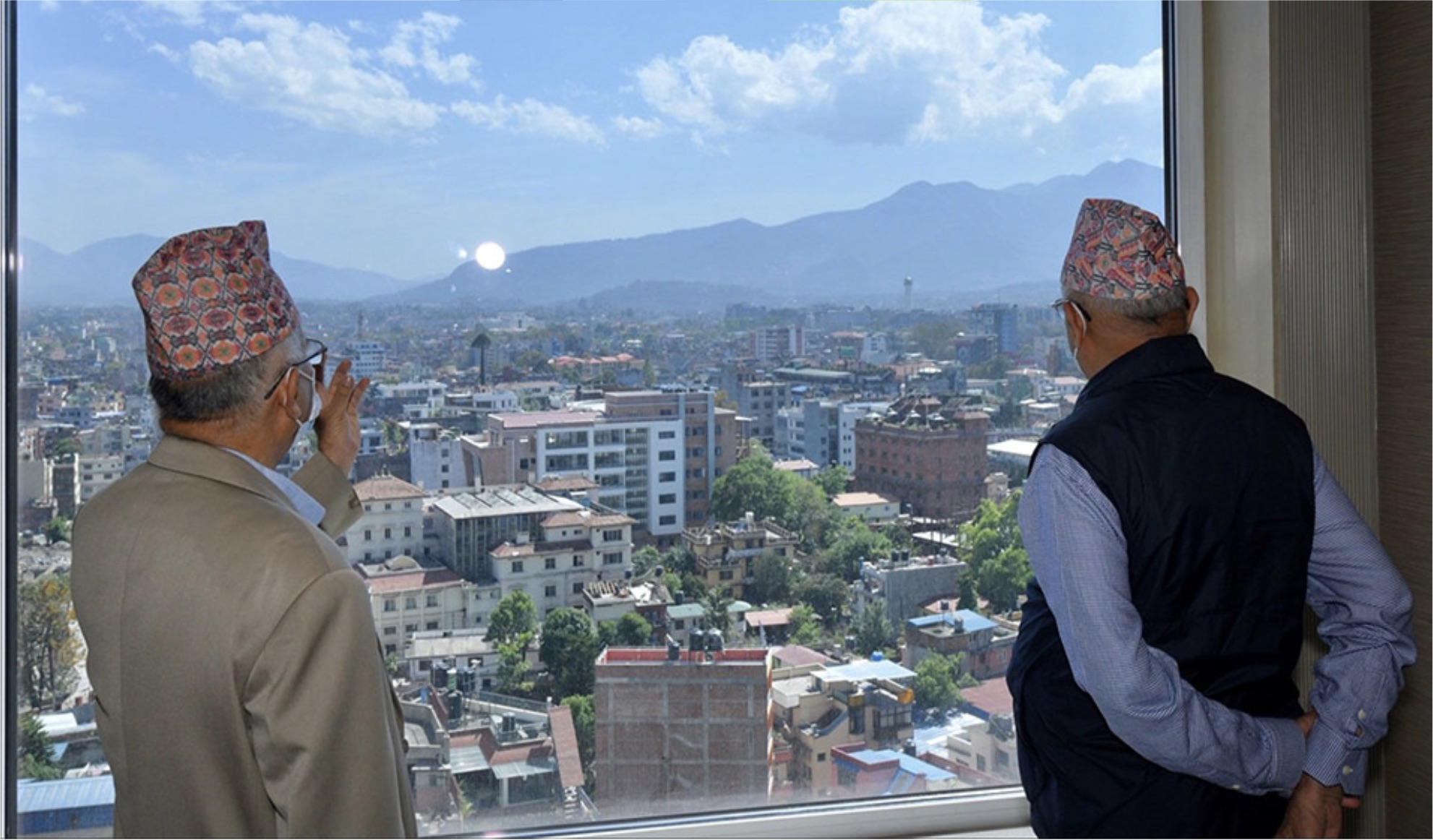Making up is hard to do

It was one of the defining images of the past year of internecine warfare among the two top leaders of the Unified Marxist-Leninist (UML) party.
Prime Minister K P Oli (KPO) and former prime minister Madhav Kumar Nepal (MKN) are seen looking out over Kathmandu Valley from the 11th floor window of the Marriott Hotel on 21 April. Nepal is pointing southwards in the general direction of Singha Darbar, and the two appear to be enjoying the view together.
But the message the photo was trying to convey was deceptive. “Of the four hours over two days they were together in the hotel, they spent three-and-half hours blaming each other,” confided a Nepal aide.
KPO needed MKN’s support to save his government, but that meeting and another one on 11 May mediated by helicopter tycoon Capt Rameshwar Thapa failed to bring the two together.
A close KPO adviser admits that the quarrel is a “जुँगाको लडाईँ”, an ego-clash between two UML alpha males which goes back two decades. When MKN led the party and was prime minister 2009-11, he would not give KPO the time of day. KPO is returning the favour.
After the UML united with the Maoist Centre in May 2018 to form the Nepal Communist Party (NCP) following their election victory, Prime Minister Oli was caught up in a power struggle with Pushpa Kamal Dahal. Nepal’s support for Dahal bolstered his strength within the NCP, allowing him to challenge Oli’s leadership of the party and government.
“There is a trust deficit between the two leaders that has built up over the years, but essentially it is not ideological,” says a UML member in the mediation group. “It can easily be resolved if the two sit down together and find a middle ground.”
KPO has worked up rage over MKN siding with Dahal, and even supporting Sher Bahadur Deuba of the opposition Nepali Congress to replace him as prime minister. Nepal was among 126 MPs to file a writ at the Supreme Court to challenge Oli’s dissolution of the House on 21 May, and to make Deuba prime minister for the fifth time.
MKN’s main gripe is that KPO was intransigent, behaved like a dictator, never listened to anyone in the party, sidelined his supporters, and even tried to overturn the constitution to get his way.
Increasingly isolated, KPO sent MKN an olive branch in May with a six-point proposal to return to a pre-unification UML Central Committee. “But even that letter had ‘ifs’ and ‘buts’ and ambiguous language that aroused suspicions that Oli was out to pull a fast one again,” said Ghanshyam Bhusal of the Nepal camp.
MKN and KPO supporters met again on Thursday in a last-ditch attempt to patch up differences with a compromise centered on whether Oli is willing to go back to the composition of the 203-member UML Central Committee before he had diluted it with 38 of his own loyalists on 16 May 2018.
This should be fairly straightforward, but KPO’s single-mindedness does not allow it. Some of Oli’s own trusted advisers admit privately that they are increasingly exasperated by the prime minister surrounding himself with yes men, and spewing out increasingly vitriolic abuse at MKN.
A day after MKN told reporters this week that KPO has offered him prime ministership, an angry KPO retorted that he had not been bitten by a mad dog to do such a thing. The prime minister’s remark was cheered by those present, but was mocked on social media.
Pushed to the edge, and with the prospect of a restored House or elections, both Oli and Nepal find that they now need each other. But at the personal level, there seems to be just too much bad blood accumulated between the two for dozens of senior party cadres to get them to make up.
MKN’s group was also in consultation all day and decided not to take up KPO's invitation to join the Central Committee meeting on Friday. Said MKN loyalist Raghuji Pant: "We will not attend a meeting that was called unilaterally without consultation. But our efforts for party unity will continue. We haven't given up yet."
With the Supreme Court deciding next week on the writ petitions, KPO is working on Plan B to cobble a majority in the House in case it is restored. For that he needs the UML to remain united with support of MKN.
Oli’s most loyal advisers Subhash Nembang and Pradeep Gyawali had opposed the prime minister’s first dissolution of the House on 20 December, and since then he has not hesitated to use extreme non-constitutional methods to keep MKN out.
Says a member of the UML mediation group: “The party will not function if we stay united, and it will be weakened if we split — either way, we are doomed. The body language of the two leaders does not indicate a desire for accommodation to save the party.”




